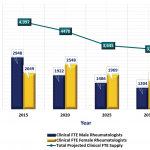Research and Funding
Currently there are between 700 and 800 academic rheumatologists in the United States.1 Academicians are generally required to conduct research and compete successfully for outside grant funding to cover at least part of their salaries. The balance must usually be covered by reaching relative value unit targets in the clinical setting, a challenge when balanced with a myriad of research, teaching, and administrative responsibilities. According to the Lewin study, 73% of academic rheumatologists are required to cover more than half of their salaries through grants, yet many are finding it increasingly difficult to do so. In recent years, funding from the National Institutes of Health has declined substantially. The ACR Research and Education Foundation (REF) and other organizations have strengthened their own grant programs to help fill this gap. The REF “Within Our Reach” program—a major funding source for RA research—is one such example.
Sixty-six percent of academic rheumatologists in the Lewin study reported that it took five to 10 years to achieve independent investigator status. Further, more than 80% of rheumatologists who left academics within the last five years said they did so because of “lack of support” or “difficulty funding research.” They were also attracted to non-academic careers by higher pay—the median compensation for private practitioners rose by 28.1% between 1998 and 2002, whereas compensation for academic faculty rose only 11.3% during the same period.1
When the Young Investigator Subcommittee of the ACR Committee on Research polled fellows about their career choices in 2006, they ranked salary among their chief concerns. It appeared from this survey that baseline interest in academia was strong but fellows were concerned about both salary and funding difficulties. The supply of new academic rheumatologists will almost certainly become limited if these financial issues are not addressed.
Funding issues must be tackled at both the local and federal levels. Institutions do not always recognize the value of rheumatology divisions or the downstream revenue they generate. As rheumatologists, we must correct these misperceptions when they arise. In addition, we should continue to advocate at a federal level for increased research funding and reimbursement for our services, both of which will contribute to the health of our academic divisions and therefore to the strength of the subspecialty.
In recent years, the ACR has met annually with Stephen Katz, MD, PhD, director of the National Institute of Arthritis and Musculoskeletal and Skin Diseases, to advocate for increased rheumatology grant funding. These interactions complement existing congressional advocacy efforts by ACR members on proposed legislation that would affect research funding or medical education support. Rheumatologists in clinical practice think mainly about advocacy related to access to care and reimbursement issues, but lobbying efforts for research snd training are equally important. In fact, in 2005 the ACR developed a rheumatology research agenda to guide our advocacy efforts in this area.



